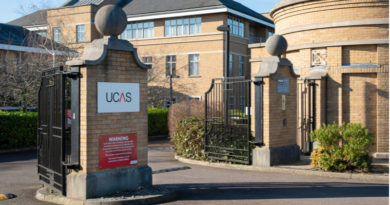UCAS data reveals a record-breaking 311,000 UK teenagers applied for university this year
Graduating students throughout the UK have seemingly shrugged off their hesitancy to move forward with their educations due to Covid as undergraduate applications came in record numbers according to Ucas data.
The admissions service reported that both the number of applications and acceptances are at their highest numbers ever with particularly high rates of applications come from women and sixth-formers.
The increase in applications suggests that students have not been deterred by the government’s push to cut funding for “low value” degrees that do little to boost graduate pay, nor do students seem to be particularly concerned about educational loans, currently averaging 40,000 pounds by the time UK students complete their degrees.
Ucas reported that 311,000 students had applied to higher education institutions ahead of the June deadline, a 10 percent increase from last year’s numbers which came in at 281,000 applications. They also noted that over half of all school leavers in Northern Ireland had applied for higher education placements, and 44 percent had applied in England.
In total Ucas recorded 682,000 applications this year including mature and international applicants, and shattered their own record with a total of 400,000 female applicants in 2021.
The impact of the pandemic has also seemingly encouraged a record number of applications to higher education nursing courses. Ucas reported nearly 66,000 nursing applications this year, marking a 19 percent increase from 2020. Additionally they reported a 23 percent increase in applications to medicine and dentistry courses.
In response, UK universities have increased their number of acceptances to meet the demand, including a 20 percent increase in offers to students living in disadvantaged areas compared to 2019. Ucas also reported record high web traffic to degree apprenticeship applications.
“These numbers show the clear demand for undergraduate study and apprenticeships is growing, rising significantly during the pandemic,” said Clare Marchant, Ucas’s chief executive.
“Universities are ready to welcome more students on to courses this autumn and have worked hard to be flexible, enabling students to progress to their next level of study.”
The Association of School and College Leaders have warned higher education bodies to be prepared for “significant educational disruption” experiences by the new cohort since the pandemic began in March of 2020.
“Despite the best efforts of schools and colleges, the learning of students will have been affected to a greatly varying extent, and the mental health and wellbeing of many young people will have been impacted by the pandemic,” the group said.
“The increase in offers by higher tariff providers to UK 18-year-olds, including those from the most deprived areas, reflects our universities’ commitment to be as fair and flexible as possible to ensure students are not disadvantaged in their applications by the changes in the awarding of A-levels this year,” added Hollie Chandler, the head of higher education policy for the Russell Group of researchers.
According to the University and College Union general secretary Jo Grady, the record high rates of applications and acceptances are not being matched by increased staff employment, indicative of redundancies and course cuts throughout the UK.
“Ultimately, cuts impact on students as staff become increasingly stressed and burned out, so it’s important that universities match increased student numbers with increased investment in their staff,” Grady said.
However, she was encouraged by increases in applications to humanities programs in the social sciences and creative arts throughout the country despite the government’s attempts to slash funding and steer students away from these courses.
“If ministers are serious about delivering a strong post-pandemic recovery, they must abandon all proposed funding cuts to the arts and take action to bolster this vital sector of the UK economy,” Grady concluded.




